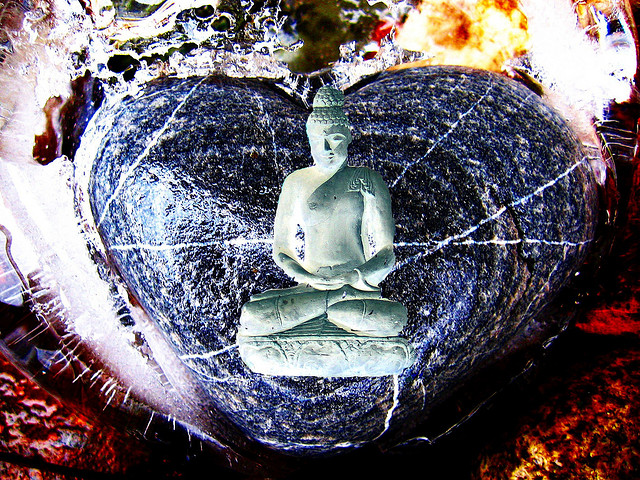There are many ways we can be softened and opened up by life, but heartbreak is probably the most effective one.
Nobody wants to hear this. It is news that we all would like to run away from. In fact, many of us choose to avoid relationships because we do not want to experience the harder aspects of them.
However, the truth is that our hearts will get broken open anyway—whether we are involved with others or not. If it does not happen because of a relationship, it will eventually happen just because of life itself.
The very nature of being human means that we are affected by our surroundings—and we can’t avoid this experience forever. We could try to escape heartbreak, but I believe it would always find us, one day. Because, it is meant to. That’s why so many spiritual practices speak about coming home to our hearts.
If we thought this homecoming was going to be painless though, we will be unpleasantly surprised.
It seems to be the structure of the heart to ache. By its construction it throbs naturally 4,800 times in one hour. That is a lot of movement. Our hearts are hard-working machines and temperamental ones at that. In Buddhism, we understand that connecting to our hearts makes us the most human.
Heartbreak is seen as a good thing in the Buddhist lineage I study. My teacher, Chogyam Trungpa, says it keeps us honest. It forces us to admit that we are human, and this is a great tool for becoming authentic and offering all that we have to give.
Heartbreak also forces us to acknowledge the truth that we have loved deeply. Isn’t that enough in itself to make this experience of being cracked open worthwhile?
One of the biggest pitfalls for us as humans is that we choose to deny the fact that we feel or that life impacts us. However, it does. Each and every one of us have been heartbroken. I am heartbroken all of the time.
I don’t mean this in a victimhood sort of way. I mean this in a way that shares that I am moved by my experience of living continually. That often, what I see, taste, hear, touch, and share with others brings a tear to my eye. Why is this so hard for us to admit?
A Buddhist perspective would say that we are organically designed to be tender, and that just like our hearts, we may throb thousands of times per day. Tenderness is actually one of the objectives of the particular type of meditation I practice. We learn that at the center of our experience, under the spinning of the mind, lies something we have been told to hide—our softness.
Heartbreak allows us to feel the soft spot at our core. What a good thing this can be. It is also one of the most revealing places another can witness in us—and when we allow it to be seen, it can paradoxically create great intimacy. So heartbreak is actually something that can produce more connection in our lives, not less. Other people are drawn to people who feel—they want to touch someone who will be affected by them—I know I do.
This soft spot in us in Buddhism is related to the term, Bodhichitta.
Bodhichitta is our desire and longing to awaken, and it is also the force that draws us to each other and to helping one another through life. Tenderness is what this soft spot produces. It also often produces tears and better human beings.
We do not need more callous people in the world. We need softer ones. There is a genuine necessity for us to be more accessible to life and to each other right now. Heartbreak can create an immediate pathway to this.
Renowned American Buddhist Nun, Pema Chodron writes: “Everybody knows the experience of being completely self-absorbed, and then something gets through. That’s a flash of bodhichitta.” That is also what the breaking of a heart reveals.
Let’s not be so afraid of heartbreak any longer. It is, after all, a universal experience—and one that makes us and life suddenly become real. In this way, a broken heart awakens us. Perhaps it’s not in the way we thought we would reach enlightenment—however, don’t things often look different than we had imagined they would?
Chogyam Trunpa says in his book Smile at Fear: ‘”When you are just there, then, if you see the actual darkness, that will inspire light.” So, if we accept our broken-heartedness and the pain that can be in it too, that is when we actually begin to lighten up.
Softness is an ideal state to be in for living well, connecting, and for awakening. It can be the tenderness of heartbreak that reminds us to fully live again.
~
Author: Sarah Norrad
Image: Flickr/Hartwig HKD
Editor: Yoli Ramazzina


 Share on bsky
Share on bsky





Read 0 comments and reply